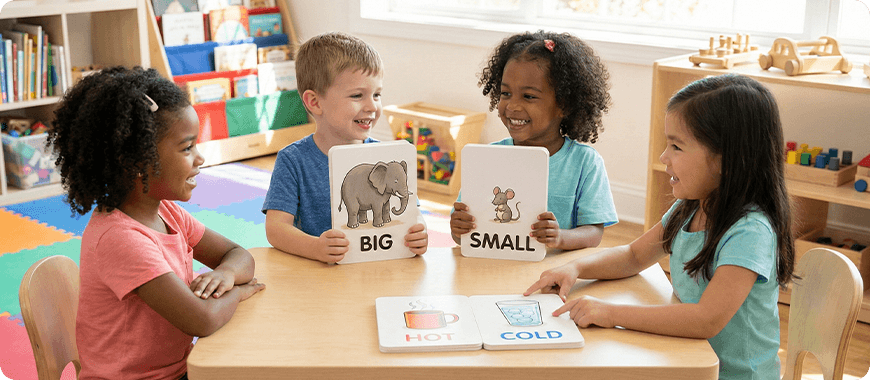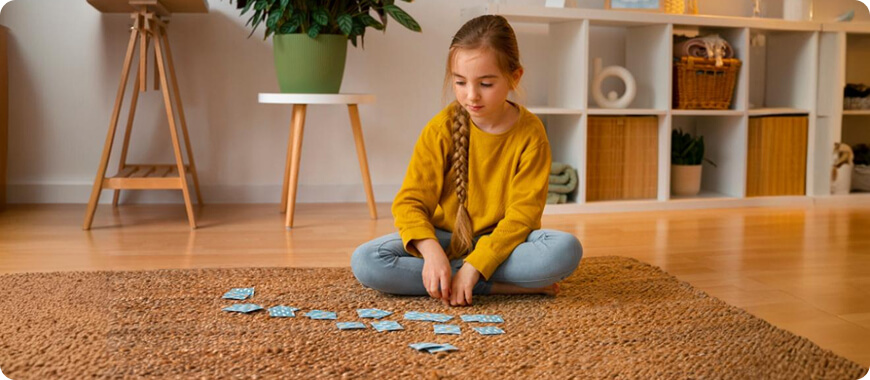Learning a language doesn’t start in a textbook — it starts in real life.
From saying “good morning” to asking “can I have some water?”, children learn best when they use common English phrases during their everyday routines. These simple but powerful sentences help kids feel more confident, communicate clearly, and connect with others — whether at home, in school, or out in the world.
At Learnlink, we believe that learning English should be natural, joyful, and full of meaningful moments. That’s why we’ve put together this guide to help you teach your child basic English phrases for kids that are used in real-life situations.
Let’s explore how these everyday English phrases can become part of your child’s daily world!
Why Everyday English Phrases Matter for Kids
Language builds confidence — especially for young learners who are just beginning to express themselves.
When children know common English phrases, they feel more comfortable speaking up, making friends, and understanding what's going on around them. Whether they're playing with other kids, watching cartoons, or talking to family members, using real-life language helps them grow in fluency and self-esteem.
Here’s why learning daily routine phrases in English is so important:
- Language Builds Confidence
Using simple phrases gives children the tools to speak up and be understood. This makes them feel proud and ready to try more complex sentences later on.
- From Home to the World: Real-World Use
From greeting someone to sharing feelings or asking for help, common English phrases and expressions are everywhere. The more kids hear and say them, the easier it becomes to understand and be understood by others.
You may wonder: “How can my child improve your English speaking?” — the answer is through repetition, context, and emotional connection. When kids use your spoken English in real-life situations, they begin to internalise the language naturally.
Essential English Phrases for Morning Routines
The morning is the perfect time to introduce common English phrases for kids . From waking up to getting dressed, these expressions help set a positive tone for the day.
Here are some useful daily English phrases for early mornings:

Try adding a little fun to the morning routine. Ask your child:
- “What do you wear in the morning?”
- “Do you like brushing your teeth?”
This kind of interaction encourages improve your English speaking skills in a gentle and engaging way.
Friendly Phrases for School and Playtime
School and playdates are great opportunities for kids to practice basic English phrases for kids in social settings.
These are some of the most useful English expressions for kids when meeting new people or joining in games:
- “Can I play too?”
- “What’s your name?”
- “That looks fun!”
- “Can I borrow this?”
- “Thank you!”
In class, teachers often use phrases like:
- “Please sit down.”
- “Raise your hand if you know the answer.”
- “Turn to page 10.”
Practising these phrases helps children follow instructions and participate more actively in lessons.
Also, don’t forget to encourage your child to ask questions like:
- “Can I go outside now?”
- “What does this word mean?”
These small interactions help build both communication skills and confidence in speaking English .
Phrases for Feelings and Emotions
Understanding and expressing emotions is an important part of growing up — and learning English can help with that too!
Try teaching your child these common English phrases and expressions for describing how they feel:

You can also encourage them to ask others:
- “How do you feel today?”
- “Are you okay?”
This not only improves their spoken English but also helps build emotional awareness and empathy.
If your child is shy or unsure, remind them that improving your English speaking takes time and practice. Encourage them to repeat useful phrases again and again — this helps with your English speaking fluency over time.
Mealtime and Manners: Speaking Polite English
Mealtime is a great chance to practice polite English phrases and build good communication habits.
Use these common English phrases during breakfast, lunch, or dinner:

Teaching polite requests like “please” and “thank you” helps kids develop both language skills and good manners.
Even small changes in vocabulary can make a big difference. For example:
- Instead of “Give me bread,” teach “May I have some bread, please?”
This shift helps children understand the meaning of this phrase and use it correctly in conversation.
Phrases for Bedtime and Winding Down
Even bedtime can be a time to learn and practice common English phrases for kids .
Try using these gentle and comforting expressions before sleep:
- “Good night, sweet dreams.”
- “Time to close your eyes.”
- “Tomorrow is a new day.”
- “Did you have a good day today?”
- “I love you very much.”
These soft, loving phrases help create a calm environment and reinforce vocabulary in a peaceful way.
You can also ask:
- “Was today fun?”
- “What was the best part of your day?”
This helps children reflect on their day and use these sentences to describe experiences and emotions.
Fun Ways to Practice Daily Phrases
The best way to learn is to enjoy it! Here are two fun methods to help your child remember and use everyday English phrases .
Turn Learning Into a Game
Create a memory game with flashcards or role-play different situations like going to the supermarket or visiting a friend.
For example:
- Parent: “Can I have an apple?”
- Child: “Yes, here you go!”
This playful interaction reinforces your spoken English in a natural way.
You can also use toys or puppets to act out common scenarios. This makes learning basic English phrases for kids more engaging and memorable.
Sing Along and Speak Up
Songs are a fantastic way to learn common English idioms and phrases. Try singing along to classics like:
- If You’re Happy and You Know It
- Head, Shoulders, Knees and Toes
- Twinkle Twinkle Little Star
Singing helps children memorise sounds, rhythms, and words — all while having fun.
Another great idea is to watch videos or cartoons that use common English phrases in context. This supports learning English through listening and repetition.
English Is All Around Us
English is not just for books and classrooms — it’s all around us, from the moment we wake up to the moment we say goodnight.
Whether your child is saying “please” at the table, asking “can I join in?” at the park, or telling you “I’m tired” before bed, they’re already using English phrases for kids in real ways.
By encouraging your child to use these most common phrases in English, you’re giving them the gift of communication — and helping them feel more confident in a global language.
So keep speaking, singing, and playing in English — because improve your English speaking doesn’t have to be hard. It just has to be fun!
Remember, improving your English speaking doesn’t happen overnight. It takes time, patience, and lots of practice. But with the right tools and support, your child will start to sound more like a native speaker every day.
And if you’re wondering where to start — look no further than Learnlink . Our courses are specially designed to help kids learn common English phrases and expressions in a way that feels natural, enjoyable, and effectiveYou can turn these moments into mini-language lessons by repeating the phrases each day. Over time, your child will start saying them naturally — without even thinking about it!
More Tips to Help Your Child Speak Naturally
- Repeat and Review : Go over key phrases regularly.
- Encourage Your Child : Praise every word they say in English.
- Speak Together : Use English during daily routines — it makes learning stick!
- Watch and Listen : Cartoons, songs, and stories in English make learning fun and memorable.
- Be Patient : Children learn at their own pace — and that’s perfectly fine.
Also, don’t forget that the most common phrase in English often includes a combination of body language and tone. So, when teaching phrases for kids, add gestures and facial expressions to make it more visual and easier to understand.
Children respond well to fun and interactive learning, so let them lead the way. If they’re interested in animals, space, or superheroes — find phrases in English for kids related to those topics. That way, learning feels personal and exciting.
Don’t worry if they mix up grammar or pronunciation at first. What matters most is that they’re using your English speaking in real-life situations — and enjoying the process.
As you continue this journey, remember that common English expressions are not just about grammar or vocabulary — they are about connection, expression, and confidence.
So keep going, stay positive, and celebrate every small success — because with every word, your child is taking another step toward fluency!











